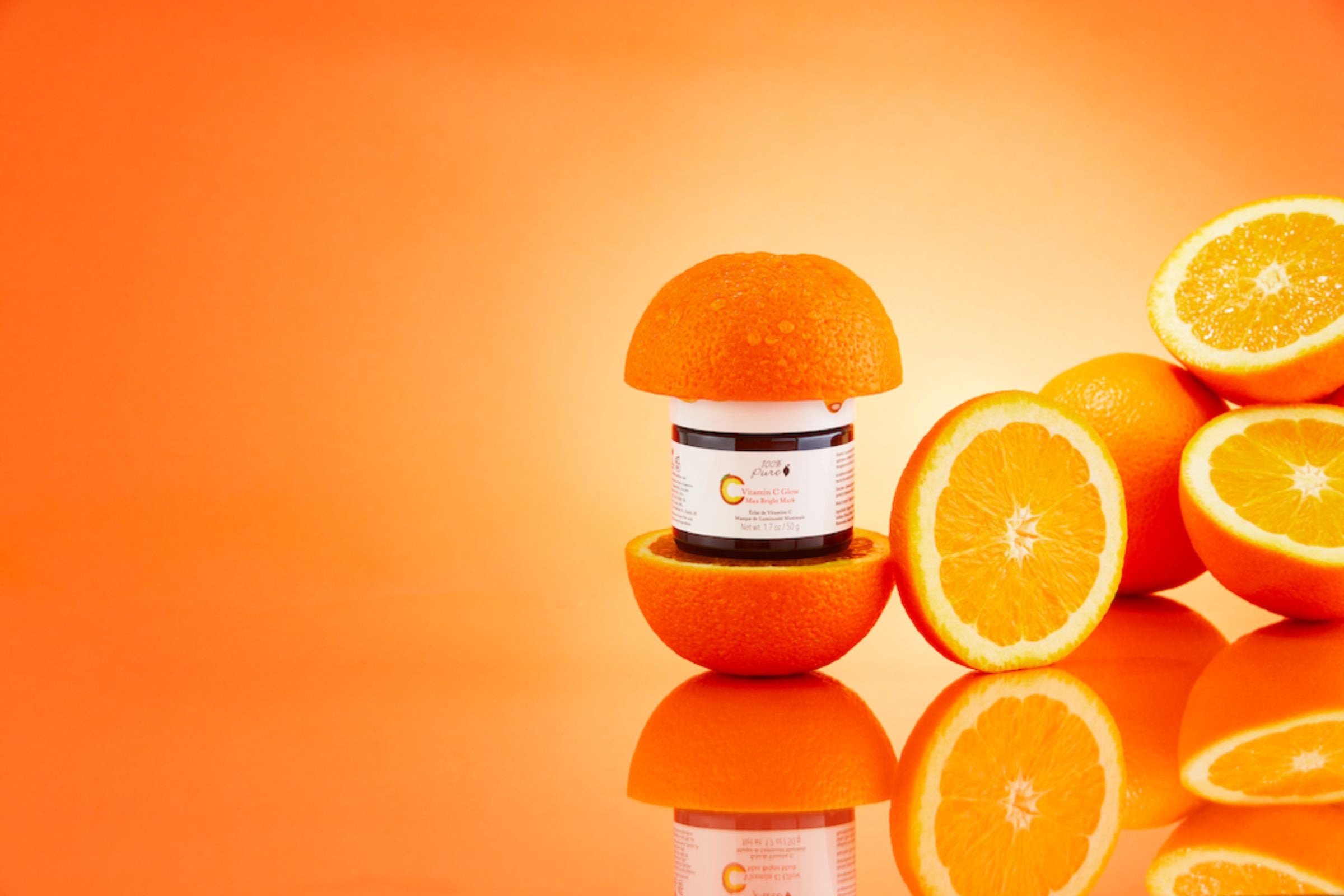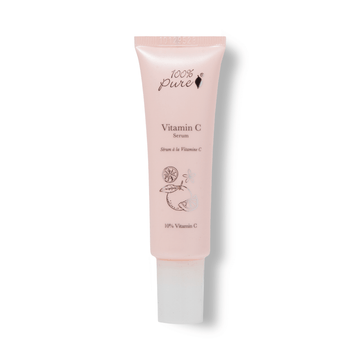Uncover the Secret to a Brighter, Even-Toned Complexion
Written by: 100% PURE®
Dark spots on the skin, also known as hyperpigmentation, can be a source of frustration for many. These spots, varying in size and color, can appear on different parts of the body but are most common on areas frequently exposed to the sun, like the face, hands, and arms. While they are usually harmless, dark spots can affect one's self-esteem and are often considered a cosmetic concern.
In the quest to find an effective solution to this common skin issue, Vitamin C has emerged as a powerful ally. This essential nutrient, known for its pivotal role in health and wellness, is also making a mark in the world of skincare. Vitamin C is celebrated not only for its antioxidant properties but also for its ability to brighten the skin and significantly reduce the appearance of dark spots. This section of the article will explore why Vitamin C should be considered your new skincare best friend in the battle against dark spots.
Dark spots, also known as hyperpigmentation, are a common skin concern affecting people of all ages and skin types. These spots, varying in size and color, can appear on different parts of the body, but are most commonly seen on areas exposed to the sun, like the face, hands, and arms.
Causes of Dark Spots
Several factors contribute to the development of dark spots:
Sun Exposure: One of the primary causes of dark spots is prolonged exposure to the sun's ultraviolet (UV) rays. UV rays stimulate the production of melanin, the pigment that gives skin its color. Overproduction of melanin in certain areas leads to dark spots.
Aging: As we age, our skin undergoes various changes. One such change is the appearance of age spots or liver spots, which are a form of dark spots. These are more common in individuals over the age of 50, but younger people can get them too, especially if they spend a lot of time in the sun.
Acne Scars: Post-inflammatory hyperpigmentation is a result of the skin's response to trauma or injury. Acne, particularly severe acne, can leave behind dark spots as it heals. These spots can linger long after the acne has cleared.
Impact on Skin Health
Dark spots, while typically harmless from a medical standpoint, can have significant effects on one’s skin health and self-esteem. From a dermatological perspective, these spots are often a sign of skin damage, especially due to sun exposure, which can have long-term consequences like premature aging and an increased risk of skin cancer.
From a psychological viewpoint, dark spots can affect self-esteem and confidence. Skin, being the most visible organ, plays a substantial role in personal appearance. Uneven skin tone caused by dark spots can make individuals self-conscious, impacting their social interactions and overall quality of life.
In the next section, we will explore why Vitamin C is an effective remedy for combating dark spots and how it can be incorporated into your skincare routine to achieve a healthier, more even complexion.

Vitamin C, also known as ascorbic acid, is a powerful antioxidant that plays a pivotal role in skin health. It's essential for the synthesis of collagen, a protein that helps keep our skin firm and youthful. Beyond its structural role, Vitamin C is known for its ability to neutralize free radicals - molecules that can damage cells and lead to premature aging.
In skincare, Vitamin C is celebrated for its brightening properties. It is a key ingredient in many topical products designed to enhance skin radiance and even out skin tone. Its antioxidative properties contribute to its effectiveness in protecting the skin from UV damage and environmental stressors, which can lead to dullness and uneven pigmentation.
How Vitamin C Fades Dark Spots
The mechanism by which Vitamin C aids in reducing pigmentation is multifaceted. Primarily, it inhibits the enzyme tyrosinase, which is crucial in the production of melanin - the pigment that gives color to our skin. By interfering with melanin production, Vitamin C helps in preventing and fading hyperpigmentation and dark spots.
Scientific studies have backed up these claims. A notable study published in the "Journal of Clinical and Aesthetic Dermatology" demonstrated that a topical application of a 10% Vitamin C serum led to a significant reduction in dark spots and overall skin discoloration after 12 weeks. The antioxidant properties of Vitamin C also contribute to repairing damage caused by UV rays and pollution, factors that often exacerbate skin pigmentation issues.
Another study, featured in the "Indian Journal of Dermatology," highlighted the efficacy of Vitamin C in combination with other skin-lightening agents like hydroquinone and kojic acid, showing that these combinations can be more effective in treating hyperpigmentation.
Types of Vitamin C Products
Present different forms of Vitamin C products (serums, creams, etc.).
Types of Vitamin C Products
Vitamin C, renowned for its antioxidant properties, is a powerhouse ingredient in skincare. It comes in various forms, each tailored to different skin needs. Understanding these types can help you choose the right one for your routine:
Vitamin C Serum: A potent form, ideal for those looking to target specific concerns like aging or dark spots.
Vitamin C Mask: This offers a more intensive treatment, perfect for a weekly boost to your skin.
Brightening Serum: A lighter option, great for daily use to maintain an even skin tone.
Multi-Vitamin + Antioxidants Potent PM Serum: A comprehensive night treatment, combining Vitamin C with other vital nutrients.
Retinol Restorative Overnight Balm: A night-time treatment focusing on repair and rejuvenation.
Product Highlights and Usage
- Benefits: Enhances collagen and elastin production; brightens skin tone; hydrates with aloe.
- How to Use: After cleansing, apply a dime-sized amount to damp skin. Press gently into the face and neck. Ideal for evening use; if used during the day, follow with SPF.
- Benefits: Supports collagen and elastin production; brightens and evens skin tone; reduces dark spots.
- How to Use: Mix 1 tbsp of powder with water to form a paste. Optionally, add facial oil for easier rinse-off. Apply to face and neck, leaving for 10-15 minutes. Use 1-5 times a week.
- Benefits: Evens out skin tone using natural ingredients like kojic acid, sake, and lemon juice.
- How to Use: Apply to slightly damp skin. Press gently onto face and neck and wait 90 seconds before moisturizing. Recommended for evening use.
Multi-Vitamin + Antioxidants Potent PM Serum
- Benefits: Reduces fine lines and wrinkles; improves firmness and skin tone.
- How to Use: Apply in the evening after cleansing. Press gently into the face and neck. Use only at night, followed by SPF in the morning.
Retinol Restorative Overnight Balm
- Benefits: Improves firmness, tone, and elasticity; reduces lines and wrinkles.
- How to Use: Warm a quarter-sized amount in hands and apply thinly on the face and neck. Use nightly, followed by SPF in the morning.
Application Tips for Maximum Effectiveness
- Gentle Application: Press, don't rub, the product into your skin. This ensures better absorption and less irritation.
- Layering: Apply lighter products like serums before heavier ones like creams or balms.
- Consistency is Key: Regular use is crucial for noticeable results.
- SPF is a Must: Vitamin C can make your skin more sun-sensitive. Always follow up with a broad-spectrum SPF in the morning.
- Patience Pays Off: Give your products time to work. It can take several weeks to notice significant changes.
Incorporating these products into your skincare routine can visibly transform your skin's health and appearance, making Vitamin C a valuable ally in your beauty arsenal.
Newsletter Subscribe
for more blog updates and exclusive discounts

Sun Protection
Protecting your skin from the sun is crucial, especially when you're trying to eliminate dark spots. Sunscreen acts as a barrier against the harmful UV rays that can exacerbate hyperpigmentation. This makes it an indispensable ally in your skincare regimen.
Green Tea SPF 30 stands out in this category. It's not just a sunscreen; it's a skincare treat. This product combines the high-level protection of SPF 30 with the nourishing benefits of green tea – renowned for its anti-aging and protective properties. The inclusion of vitamin E, a powerful antioxidant, further enhances its effectiveness. This sunscreen doesn't just shield your skin; it pampers it. It's formulated with natural mineral zinc oxide and is enriched with hydrating aloe and cucumber juice. Oils from raspberry, avocado, olive, and rosehip ensure your skin remains soft and moisturized throughout the day, making this sunscreen a perfect all-day wear.
Exfoliation
Exfoliation is a key step in enhancing the effectiveness of Vitamin C in your skincare routine. It removes the outer layer of dead skin cells, allowing Vitamin C to penetrate deeper and work more effectively.
The 10% Fruit Acids Apple Enzyme Resurfacing Serum is an excellent product for this purpose. It's a re-surfacing, regenerative serum that brightens and evens skin tone. The unique blend of licorice, kojic acid from sake, and fruit enzymes from pineapple, green apple, citrus, and papaya works wonders. These ingredients collectively lighten scars and dark spots while promoting cellular turnover for smoother skin. The serum also minimizes the appearance of pores, ensuring a flawless complexion.
Deep Cleansing
Deep cleansing is essential for maintaining healthy skin and enhancing the efficacy of Vitamin C treatments.
Charcoal Clay Cleanser is an excellent choice for detoxifying your skin. It features a blend of bamboo charcoal and skin-purging clay, effectively washing away makeup and impurities. This cleanser refreshes the skin and controls oil without causing dehydration. Essential oils of spearmint, lemongrass, and lemon water not only invigorate the senses but also offer anti-bacterial properties and skin brightening effects.
Acai Pulp Facial Scrub is another powerful tool in your skincare arsenal. This all-natural exfoliator is designed to provide a deep sweep for the pores, promoting a glowing and youthful complexion. Its concentrated formula, made with crushed organic acai berries, is rich in vitamins, minerals, antioxidants, and fatty acids. It's particularly effective due to its high contents of vitamins A and C, which are essential for skin health. Remember to use it on wet skin for a gentler exfoliation experience.
By incorporating these complementary skincare practices into your routine, you can significantly boost the effectiveness of Vitamin C in eliminating dark spots, leading to a healthier, more radiant complexion.
How Long Does It Take to See Results from Vitamin C?
Vitamin C is renowned for its skin-brightening and anti-aging properties, but it's not an overnight miracle. Typically, you can expect to see noticeable improvements in your skin's texture, tone, and overall radiance within 4 to 8 weeks of consistent use. The key is regular application and patience, as the effects of Vitamin C build up over time.
Can All Skin Types Use Vitamin C?
Absolutely! Vitamin C is a versatile ingredient suitable for all skin types. Those with sensitive skin might experience mild irritation initially, but this often resolves with continued use. For sensitive skin types, it's advisable to start with a lower concentration of Vitamin C and gradually increase as your skin becomes more accustomed.
What Concentration of Vitamin C is Most Effective?
Vitamin C concentrations range from as low as 5% to as high as 20%. Studies suggest that a concentration of 10-20% is most effective for skin penetration and results. However, higher concentrations do not always mean better efficacy and can sometimes lead to irritation. A 10% concentration is a good starting point for most users.
How Do I Store Vitamin C Products?
Vitamin C is sensitive to light and air, which can cause it to degrade and lose its potency. To maintain its effectiveness, store Vitamin C products in a cool, dark place and ensure the container is tightly closed after each use. Opt for products in airless pumps or opaque, airtight containers to maximize shelf life.
Can I Use Vitamin C with Other Skincare Ingredients?
Vitamin C pairs well with many other skincare ingredients. It works exceptionally well with Vitamin E and ferulic acid, enhancing its stability and effectiveness. However, be cautious when using it with retinoids or AHA/BHAs, as this can lead to irritation. It's often recommended to use Vitamin C in the morning and retinoids or acids in the evening.
As we reach the conclusion of our exploration into the wonders of Vitamin C for skin health, it's important to revisit and underscore the remarkable benefits this powerhouse ingredient offers, particularly in treating dark spots. Vitamin C, a potent antioxidant, not only addresses hyperpigmentation but also plays a crucial role in revitalizing and enhancing skin texture and tone.
Firstly, the ability of Vitamin C to inhibit melanin production is a game-changer in the realm of skincare. This mechanism directly targets the root cause of dark spots, ensuring that these blemishes are not only treated but also prevented from recurring. The result is a more even and radiant skin tone, something everyone yearns for.
Moreover, Vitamin C's antioxidant properties are pivotal in shielding the skin from environmental aggressors like UV rays and pollution. These factors often contribute to the formation of dark spots and accelerated skin aging. By neutralizing free radicals, Vitamin C helps maintain skin health and prevents the deterioration that leads to uneven skin tone and texture.
In addition to its pigmentation-fighting capabilities, Vitamin C also promotes collagen production. This is vital for skin elasticity and firmness, further contributing to a youthful and glowing complexion. The result is not just a reduction in dark spots but an overall improvement in skin health and appearance.
So, what does this mean for you, the reader? It's a call to action to make Vitamin C a staple in your skincare regimen. Whether you're dealing with existing dark spots or aiming to prevent them, incorporating Vitamin C into your daily routine can lead to brighter, more even-toned, and resilient skin. From serums to creams, the options are plentiful, making it easy to find a product that suits your skin type and preferences.
In conclusion, embracing Vitamin C in your skincare routine is more than just a trend; it's a science-backed strategy for achieving and maintaining flawless, radiant skin. Say goodbye to dark spots and hello to a brighter, more even-toned complexion with the magic of Vitamin C. Your skin will thank you for it!
- Tags: December-2023, Skin Care, skincare
We carefully hand-select products based on strict purity standards, and only recommend products we feel meet this criteria. 100% PURE™ may earn a small commission for products purchased through affiliate links.
The information in this article is for educational use, and not intended to substitute professional medical advice, diagnosis, or treatment and should not be used as such.
















